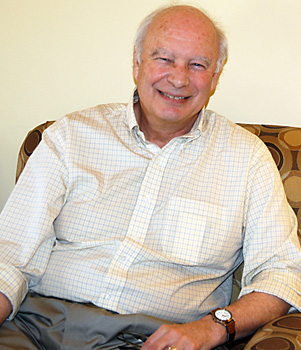Mental health ministry integral to churches
From 24 years of promoting a companionship ministry with the Mental Health Chaplaincy, the Rev. Craig Rennebohm is training pastoral counselors, faith groups and mental health workers to respond to people suffering from mental illness, substance abuse, trauma, aging and children’s mental health issues.
“Mental health ministry is integral for a healthy congregation’s life,” he said. “We all are fragile and vulnerable, needing tenderness and understanding. As we learn to care for each other, we are healthier individuals, families and congregations. Equipping neighbors to be neighbors is a way to discover what is necessary for healing, peace and well-being in the world,” he said.
 |
Craig Rennebohm promotes companion ministry. |
Craig is organizing several Faith Group Mental Health Training Cooperatives through Pathways to Promise, a national, interfaith, mental health organization.
He offered sessions in December in Spokane to help clergy discern their role in mental health healing, recovery and wellness.
Craig said trauma affects veterans, abuse victims, immigrants, people with dementia and people suffering from destructive forces of history and society—slavery, racism, inequality and sexism.
“We need a companion ministry with those who suffer, so we can learn their real stories, unvarnished by media or social-political myths. Then people are informed about struggles of our brothers and sisters. We need contact with ‘the least’ to be aware of the trauma poor and homeless people face,” he said.
Visiting the Balkans after conflicts in Croatia and Bosnia, he saw the need for mental health resources to help restore peaceable life together.
“We need to build our capacity to deal with trauma and foster peace,” he said. “If we address unspoken issues for traumatized, oppressed people, we can overcome injustice. By knowing people, we can develop realistic, effective programs and public policies.”
Craig often walks on Third Ave. in Seattle with people on the street, pushed aside by the economy run by people who work at the banking skyscrapers. He said executives, who have “robbed people of homes and undermined the economy,” make decisions on top floors with no idea of the suffering those decisions cause for people on the streets below.
“We need mutual responsibility to ameliorate extremes of wealth and poverty. We need to value caring for and sharing with each other,” he said.
After studies at Carlton College and Chicago Theological Seminary, Craig was minister to the community at a United Church of Christ church in a low-income Lowell, Mass., neighborhood.
In 1975, he came to Pilgrim United Church of Christ, a dying Seattle congregation with 18 at worship. They sold the parsonage to provide two years of salary. He helped the church focus on mission to the neighborhood of seniors, low-income families, single mothers, heroin dealers and group homes. As the neighborhood and church drew higher-income families, he challenged them to be welcoming.
Pilgrim developed a day drop-in center for homeless people, an emergency shelter, a meals program and a clothing bank. It became a base for service groups. Sunday mornings became a time when 150 to 200 came to celebrate the diverse community.
“By doing mission, the congregation grew,” said Craig who equipped laity for outreach, developing training for people to be colleagues in ministry.
In 1987, he earned a doctor of ministry at Pacific School of Religion in Berkeley in pastoral care with people suffering mental illness. In clinical pastoral education at the psychiatric unit of the county hospital, he saw people who came in confused, delusional, bipolar, hallucinating, schizophrenic or depressed recover as medications helped rebalance the brain’s biochemistry. He found faith had an impact, too.
“When people lose the capacity to hope, think and imagine, the brain becomes stuck in negative feelings and thoughts,” he said. “It shuts down its capacity to pray, study scripture and converse.
“The key to reaching them is to be a companion in a relationship of support, healing and recovery in a congregation,” Craig said. “Mental health includes how neighborhoods create a fabric of care.”
In 1987, he started the Mental Health Chaplaincy at the Church Council of Greater Seattle to 1) do outreach on the streets with homeless, mentally ill and marginalized people; 2) follow people from the hospital or the street to stable housing; 3) train congregations to welcome and support people released from hospitals and 4) improve mental health policies.
Prospect United Church of Christ (UCC), where he is associate pastor, and Plymouth Congregational UCC provide companionship and housing. Four volunteer companions live with people released from the hospital at Plymouth’s House of Healing. Residents live there four to six months to regain strength before moving to permanent housing Plymouth offers.
Prospect has an ecumenical outreach that serves lunch to 250 neighbors. Volunteer companions greet people in line, eat with them, listen to their stories, encourage them and offer resources.
“Companions walk side-by-side as neighbors with people on the margins—from greeting strangers to creating housing and services,” he said. .
“We begin with people where they are—in a doorway, under a bridge, at a meal or in a shelter,” Craig said. “We proceed as neighbors, not professionals with expertise. We treat people with respect, putting aside power and meeting as human beings—as they are and as we are—as two people on life journeys,” he said.
“In companioning, we are companioned, walking together with God in inexplicable moments and remarkable ways,” he said.
For information, call 206-329-0337 or 838-4409 or email werenne@comcast.net.
Copyright © March 2011 - The Fig Tree




